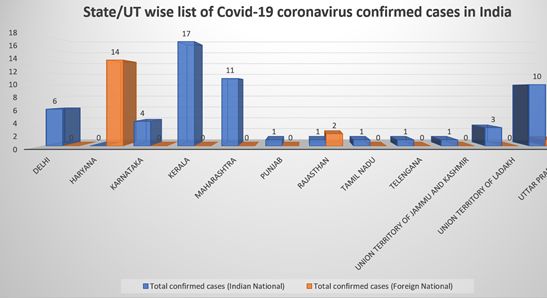
Introduction
In India, the number of confirmed cases of COVID-19 coronavirus has reached 73 (as of 12 March 2020: 4 PM), and several other cases are being examined for confirmation.
In our previous advisory dated 5 March 2020 (Advisory), we examined the measures which may be considered by employers to balance their business interests with the need to ensure safety at the workplace. Further to the same, we set out important developments in terms of the guidelines issued by the Government of India (GOI) and the State governments since the release of the Advisory.
Important guidelines from GOI
Travel restrictions
The latest travel advisories issued by Ministry of Health and Family Welfare (Ministry), GOI, provide a range of travel restrictions, some of which are set out below:
With effect from 13 March 2020, all existing visas (other than those issued in respect of diplomats, officials, United Nations, international organisations, employment and projects) issued to nationals of any country would stand suspended till 15 April 2020. If any foreign national intends to travel to India for compelling reasons, he / she may contact the nearest Indian Mission for issue of visa. The visas issued to foreign nationals presently in India will, however, remain valid.
With effect from 13 March 2020, an Indian national arriving from any destination and having visited China, Italy, Iran, Republic of Korea, France, Spain or Germany on or before 15 February 2020 will be subject to quarantine for 14 days (given that the said period is typically the time taken by an infected person to reflect symptoms).
The Ministry has advised against visiting China, Italy, Iran, Republic of Korea, Japan, France, Spain and Germany.
Invoking Epidemic Diseases Act, 1897
Pursuant to another set of instructions released on 11 March 2020, the Ministry would advise all States and union territories to invoke the provisions of Section 2 of Epidemic Diseases Act, 1897 (EDA). The EDA, aimed at containing the spread of dangerous epidemic diseases, empowers State governments to take such measures (including imposing temporary regulations) as they deem fit to prevent the outbreak of a dangerous epidemic disease. Once the State governments invoke the provisions of EDA, the advisories being issued by GOI, States and union territories on COVID-19 would become enforceable against the violators, who could be punished under Section 188 of the Indian Penal Code 1860 (IPC) (dealing with disobedience to an order of a public servant).
Work from home
As per another press release published by the Press Information Bureau on 10 March 2020, it has been recommended that all passengers having travel history to China, Hong Kong, Republic of Korea, Japan, Italy, Thailand, Singapore, Iran, Malaysia, France, Spain and Germany should undergo self-imposed quarantine for a period of 14 days from the date of their arrival. Further, if such passengers are working in some organization / institution, their respective employers should facilitate work from home during this period.
Measures taken by states
KARNATAKA
Karnataka has taken a range of measures with the intent to avert the contagion and promote reporting of suspected cases. These measures are set out below:
In addition to the guidelines on workplace hygiene (as examined by us in the Advisory), the Government of Karnataka has issued the Karnataka Epidemic Diseases COVID-19 Regulations 2020 under the EDA. Under the regulations, every person arriving in the State from a COVID-19 affected area in the last 14 days (presumably from the date of arrival in India) is required to report to the nearest government hospital. If the person is not displaying any flu-like symptoms, he / she should nonetheless self-isolate himself / herself.
Under the regulations, certain authorities have been designated as 'authorized persons' responsible for enforcing the regulations, including Director – Health and Family Welfare Services, Director – Medical Education (State level), and Deputy Commissioner – District Health Officer (district level).
The authorized persons have been empowered to isolate a person if he / she has had a history of travel to a COVID-19 affected area or has come into act with a person from such area who is symptomatic. The regulations also provide that non-compliance with the provisions would entail a penalty under Section 188 of the IPC.
In addition to the above, employers (particularly large organisations) in the information technology sector in Karnataka are being requested by Commissioner, Health and Family Welfare Services, to provide details of persons who have travelled to COVID-19-affected countries in a specified format. More clarity is awaited from authorities to understand what the cut-off date should be to determine whether a person has had a history of travel to the affected countries.
DELHI
While detailed State guidelines directed at employers are awaited, the Delhi Chief Minister has appealed to all employers to allow paid leave to employees who have been quarantined so that their livelihood is not affected.
ODISHA
The government of Odisha has released guidelines on workplace safety and hygiene. Among other things, employers have been advised to regularly clean surfaces and objects with disinfectants containing 70% alcohol and to provide soaps or sanitizers at the workplace. If an employee develops flu-like symptoms, he should be advised to isolate himself. As part of precautionary measures, employers should exercise caution against sending employees to COVID-19-affected countries, except on an urgency basis.
Conclusion
In view of the rapidly changing situation concerning COVID-19, employers should constantly monitor compliance with the guidelines being issued at Central and State levels and adopt practices that balance their interests with the health and safety of their employees. Do watch out this space for further updates.
The content of this document do not necessarily reflect the views/position of Khaitan & Co but remain solely those of the author(s). For any further queries or follow up please contact Khaitan & Co at legalalerts@khaitanco.com



